NATURAL PLANT TOXICANT – CYANOGENIC GLYCOSIDE AMYGDALIN: CHARACTERISTIC, METABOLISM AND THE EFFECT ON ANIMAL REPRODUCTION
DOI:
https://doi.org/10.15414/jmbfs.2015.4.special2.49-50Keywords:
Amygdalin, metabolism, reproductionAbstract
The amount of cyanogenic glycosides, as natural plant toxicants, in plants varies with plant species and environmental effects. Cyanogenic glycoside as an amygdalin was detected in apricot kernels, bitter almonds and peach, plum, pear and apple seeds. Amygdalin itself is non-toxic, but its HCN production decomposed by some enzymes is toxic substance. Target of this review was to describe the characteristic, metabolism and possible effects of amygdalin on reproductive processes. Previous studies describe the effects of natural compound amygdalin on female and male reproductive systems focused on process of steroidogenesis, spermatozoa motility and morphological abnormalities of spermatozoa. In accordance to the previous studies on amygdalin its benefit is controversial.Downloads
Download data is not yet available.
Downloads
Published
2015-02-02
How to Cite
Kolesár, E., Halenár, M., Kolesárová, A., & Massányi, P. (2015). NATURAL PLANT TOXICANT – CYANOGENIC GLYCOSIDE AMYGDALIN: CHARACTERISTIC, METABOLISM AND THE EFFECT ON ANIMAL REPRODUCTION. Journal of Microbiology, Biotechnology and Food Sciences, 4(special issue 2 (Biotechnology), 49–50. https://doi.org/10.15414/jmbfs.2015.4.special2.49-50
Issue
Section
Biotechnology
License
Copyright (c) 2015 Eduard Kolesár, Marek Halenár, Adriana Kolesárová, Peter Massányi

This work is licensed under a Creative Commons Attribution 4.0 International License.
All papers published in the Journal of Microbiology, Biotechnology and Food Sciences are published under a CC-BY licence (CC-BY 4.0). Published materials can be shared (copy and redistribute the material in any medium or format) and adapted (remix, transform, and build upon the material for any purpose, even commercially) with specifying the author(s).





